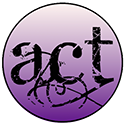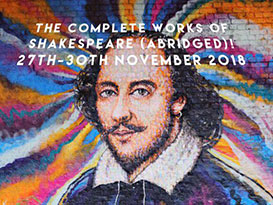Association of Community Theatre

The Complete Works of William Shakespeare”
(abridged) (revised)
by Adam Long, Daniel Singer & Jess Winfield.
Worsley I.T.S.
 Originally presented by The Reduced Shakespeare Company, The Complete Works was first performed more or less entirely (abridged and revised) in 1987 in California, and subsequently at the Edinburgh Fringe. When it came to London, Reed Makin replaced Daniel Singer. It was written for three actors who appear in the script as character name preceded by the actor’s initial, in your case for example – S (Juliet) N (Romeo) and A (Hamlet). The show comments on contemporary events to place Shakespeare’s works in a modern context updating the many topical references as events warrant, or replacing equivalent dialogue say from popular soap opera, and put downs of the famous when required.
Originally presented by The Reduced Shakespeare Company, The Complete Works was first performed more or less entirely (abridged and revised) in 1987 in California, and subsequently at the Edinburgh Fringe. When it came to London, Reed Makin replaced Daniel Singer. It was written for three actors who appear in the script as character name preceded by the actor’s initial, in your case for example – S (Juliet) N (Romeo) and A (Hamlet). The show comments on contemporary events to place Shakespeare’s works in a modern context updating the many topical references as events warrant, or replacing equivalent dialogue say from popular soap opera, and put downs of the famous when required.
The show developed through improvisation and ad lib, pretending to make it up as they went along – enthusiasm and boundless energy, and pretend no clue about Shakespeare’s works. Actors are supposedly surprised by each line, action and turn of events. There is much audience participation to which characters respond honestly, and because each audience is basically different, there is no need to stick exactly to script. At first the audience don’t really know if that member of the audience who responded is a plant or not: did Nick really step on Andy or not; and does Andy really watch Strictly Come Dancing or not? The original actors were instructed to “have fun” and “do it faster”. The whole production is supposed to be a representation of low budget Elizabethan theatre and there are four “ons and offs”, called escapes. There is a bookstand CS containing one book – a large copy of the Works of Shakespeare – to which, and from which reference is made from time to time, as, of course, the actors know nothing about it at all. Large black frames hide costume changes and props.
Andy Chase, as the House Manager, welcomes us all and offers us a few brief announcements, such as, where the bathroom is, use of telephones and the use of oxygen masks in case the theatre loses pressure, and other useful hints for our comfort and safety. After asking for a show of hands from everybody who has ever read a Shakespeare play, the result of which told him that we knew more than the cast did, we were off on a theatre journey like never before.
We were in the hands of Andy Chase, already met, Sarah Kirk and Nick Eccles.
I have gone into some length about the entertainment so that readers would have some idea about what was going on, but don’t propose to individualise cast members. Sarah, Nick and Andy were essentially a team with an incredible job to do i.e. a vast amount of dialogue to learn; a quite unbelievable number of costume changes, some almost instantaneous, some involving change of sex; ad-libbing without appearing to; frequent movement, some athletic, some choreographic; fearsome pace; ability to think ahead and be prepared to reply when you never heard the line before; and a skill I don’t think I’ve ever come across in a lifetime of amateur theatre. I’ll save that for a choice bit towards the end.
Sarah, Nick and Andy worked with, to and for each other. They used their faces, voices and even their bodies to point other actors’ laughs, to set up situations, to involve the audience, to maintain pace when necessary, to dare the audience not to laugh; to respect each other; to give pleasure and, in some inexplicable way, honour Shakespeare. Very well played, the three of you – you took us on an adventure tonight which will live long in the memory.
However, they couldn’t have done it on their own. Simon Griffiths was the mastermind behind the whole production. He drew from his cast optimum performances, using their personal skills and temperaments to maximum effect. He made sure they enjoyed what they were doing, and they communicated that enjoyment to the audience. He used their skills, and no doubt their ideas, too, when necessary. Well done, Simon on a far from easy production.
The bit I’ve saved. The play necessitated 37 plays in 97 minutes. As they had a few minutes left, they did the last page or so again, only this time backwards, every single word. How did they do that? All three of them. Took me back to Salford Grammar School where I was known as Nairb Ruomyes. How the past catches up with you.
Well done to all involved in this production. “We are such stuff as dreams are made on”. My contribution to Shakespeare.
Happy play making. Thank you for your warm welcome.